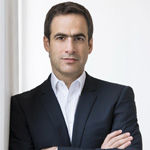Michel Moawad, the head of the Independence Movement paid a visit to the presidential palace in Baabda during which he discussed with the President of the Republic General Michel Sleiman the latest developments on the local scene including the election law. Following the meeting, Mouawad made the below statement:
“Meeting with President Sleiman was a good opportunity to discuss the latest national developments including the ongoing debate pertaining to the election Law. In this line, I must salute the President’s bold stand in which he courageously refused the adoption of any election law that could work against the instructions of the Charter and the Constitution, including the so-called orthodox law”.
Moawad added: “We highly value the Bkerkeh initiative to gather all Christian forces around one consensual election law. We also stress the need to improve the current Christians’ representation by rectifying the founding principles of the current national partnership and coexistence model, bent by the successive election laws since 1992. And while we acknowledge these factors, we truly consider that the adoption of the Elie Ferzli law will have serious and dangerous repercussions on the very essence of the Republic and the Christians’ free existence in Lebanon.
First: If it is true that the Elie Ferzli law would allow all the Lebanese confessions, including the Christians, to choose their members of parliament, we believe that other similar laws exist with far less perilous repercussions on the long term. An example of such laws would be the small-district law submitted by our allies and which ensures a truthful representation without threatening the Charter or the State.
Second: The Elie Ferzli law confines the Lebanese citizens in their respective sectarian bubbles while gradually abolishing any common grounds between them until they turn against each other. The damages of such a new system will primarily affect the Lebanese state which will fall hostage to sect leaders, which in turn would seriously threaten the Lebanese identity and would turn Lebanon into an uncontrolled conflict zone for battling sects. In the absence of a truly efficient state and a modern republic, Christians will eventually become the weak link on the Lebanese scene, whether because of their shrinking number or because of the prevailing circumstances. Therefore, to protect the Christians, we need to safeguard the liberal and modern Lebanese identity as well as the Republic and its institutions, in addition to safeguarding the Charter. We also need to build a strong state, capable of imposing the reign of the law over all territories and citizens.
Three: This law leaves the door wide open to the logic of numbers and will make way to the tri-party principle, noting that the results of any elections held under this law will show a great difference in the size of the representation which would eventually endorse the partisans of the tri-party principle instead of the equal-share principle.
Four: In light of the slowly but persistently shrinking size of the Christian community in Lebanon, the true guarantee for a free and efficient Christian existence in the country would need to be based on a eminent role for the Christians in the government which requires the integration of the Christians in their environment, the consideration of their opinions in common sectarian matters and the respect of their choice for moderation. Like prescribed in the Synodos, Christians are not just a minority that coexists with a majority; it is an active community that has a decisive role and a say in the future of the country. If we adopt the Elie Ferzli law, we would be substituting integration and interaction with “cohabitation”, which will surely consolidate extremist tendencies and weaken moderation. We would be threatening the essence of a liberal Christians’ existence in Lebanon for the Christian Lebanese cannot truly enjoy their freedom in a constrained environment.
Five: The Ferzli law threatens a distinctive Christian feature which Christians have strived to preserve throughout their history; this law directly affects the Christians’ presence on all of the Lebanese territory, from North to South and from the capital to the eastern borders. By taking away the sovereign right of the Christians to elect their members of parliament in their regions, even if those members were of different sects or non-Christians, the Christian vote will no longer count. Christians will be marginalized and their requests will not be answered which paves the way for an internal exodus that would largely affect their role and influence on the national scale. What would happen to the interests of the Maronite community of Koura or to the Catholics of the West Bekaa or even the Christians of Denniyeh? Who will grant them their rights and fulfill their needs in case they didn’t have a say in the election of their regions’ members of the parliament as stipulated in the Elie Ferzli law?”
Moawad concluded: “Improving the Christian representation is a rightful demand that we hold on to. If the Ferzli law passes, we could be facing a real catastrophe, just like it was the case with the Doha law when certain groups claimed “that each party should get back what is lawfully theirs”. The path suggested by the Elie Ferzli law is not the right way to improve the Christian representation. It only puts our state, our Charter and the principle of moderation at risk, thus hitting the real foundations of the free Christian existence in Lebanon. Leaving the Doha law behind is a must to improve the Christian representation; but we should know how to move forward not go backwards. This is why we believe that adopting the small-district law would be a better option since it will ensure a rightful representation of the Christians without it burdening or strategically threatening the foundations of our nation.”







 العربية
العربية